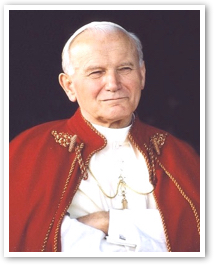Righteousness and the Commandments
- POPE JOHN PAUL II
God's commandments show man the path of life and they lead to it.
 From the very lips of Jesus, the new Moses, man is once again given the commandments of the Decalogue. Jesus himself definitively confirms them and proposes them to us as the way and condition of salvation. The commandments are linked to a promise….
From the very lips of Jesus, the new Moses, man is once again given the commandments of the Decalogue. Jesus himself definitively confirms them and proposes them to us as the way and condition of salvation. The commandments are linked to a promise….
You shall love your neighbor as yourself (Mt 19:19; cf. Mk 12:31). In this commandment we find a precise expression of the singular dignity of the human person, "the only creature that God has wanted for its own sake." The different commandments of the Decalogue are really only so many reflections of the one commandment about the good of the person, at the level of the many different goods which characterize his identity as a spiritual and bodily being in relationship with God, with his neighbor and with the material world. As we read in the Catechism of the Catholic Church, "the Ten Commandments are part of God's Revelation. At the same time, they teach us man's true humanity. They shed light on the essential duties, and so indirectly on the fundamental rights, inherent in the nature of the human person."
The commandments… are meant to safeguard the good of the person, the image of God, by protecting his goods. "You shall not murder; you shall not commit adultery; you shall not steal; you shall not bear false witness" are moral rules formulated in terms of prohibitions. These negative precepts express with particular force the ever urgent need to protect human life, the communion of persons in marriage, private property, truthfulness, and people's good name.
The commandments thus represent the basic condition for love of neighbor; at the same time they are the proof of that love. They are the first necessary step on the journey towards freedom, its starting point. "The beginning of freedom," Saint Augustine writes, "is to be free from crimes...such as murder, adultery, fornication, theft, fraud, sacrilege, and so forth. When once one is without these crimes (and every Christian should be without them), one begins to lift up one's head towards freedom. But this is only the beginning of freedom, not perfect freedom...."
 This is Meaghen Gonzalez, Editor of CERC. I hope you appreciated this piece. We curate these articles especially for believers like you.
This is Meaghen Gonzalez, Editor of CERC. I hope you appreciated this piece. We curate these articles especially for believers like you.
Please show your appreciation by making a $3 donation. CERC is entirely reader supported.

Acknowledgement
 Saint John Paul II. "Righteousness and the Commandments." from Veritatis Splendor (Encyclical Letter, 1993): 12-13.
Saint John Paul II. "Righteousness and the Commandments." from Veritatis Splendor (Encyclical Letter, 1993): 12-13.
Used with permission Libreria Editrice Vaticana.
The Author

 Saint Pope John Paul II (1920-2005) was elected Pope in 1978 and served until his death in 2005. Among his many writings are: Crossing the Threshold of Hope, Man and Woman He Created Them: A Theology Of The Body, Love and Responsibility, The Splendor of Truth, and The Gospel of Life: Evangelium Vitae.
Saint Pope John Paul II (1920-2005) was elected Pope in 1978 and served until his death in 2005. Among his many writings are: Crossing the Threshold of Hope, Man and Woman He Created Them: A Theology Of The Body, Love and Responsibility, The Splendor of Truth, and The Gospel of Life: Evangelium Vitae.




